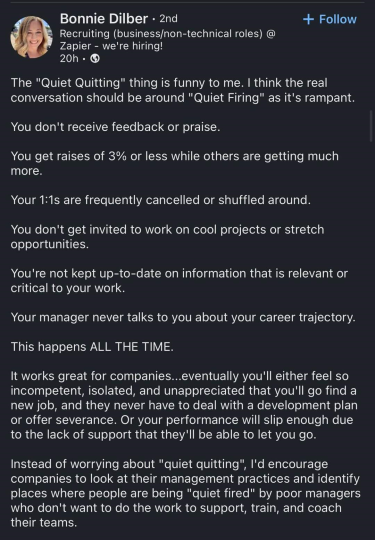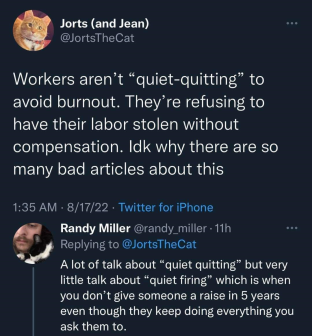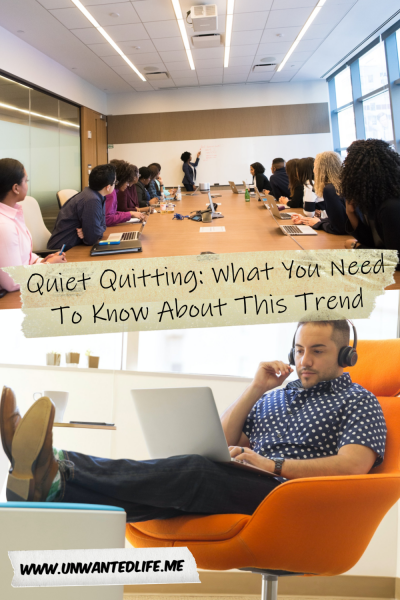Quiet quitting has recently splashed across the news media over the last few months. Quiet quitting and its numerous spinoffs can also be found on social media and human resource news (The School of Positive Psychology).
A lot of these media sources have taken the side of businesses to lay the blame at the feet of the workers, rather than the work environments. Businesses like Amazon move heaven and earth to squash workers’ Unions and force employees to pee into bottles. The most they’ll do is weaponise wellness ideas as a slap-in-the-face gesture to show they “care”. If they actually cared, they’d change the work environment to a more healthy one.
What Is Quiet Quitting?
According to Huffington Post, quiet quitting is how people explain why they’re not doing more than the bare minimum to stay employed. When quiet quitting, people decide to not work late, to give up on the work hustle culture, and not seek out extra work (Psychology Today). What often gets forgotten or deliberately misstated about quiet quitting is the fact that people are still working to the letter of their employment contracts (Huffington Post).

Quiet quitting isn’t unjustified. It’s a wellbeing movement, and don’t let anyone convince you otherwise. Most problems in our lives can be put down to our poor work/life balance. We’re overworked, underpaid, and treated as expendable. It was inevitable that people were going to say enough is enough. There’s no reason why anyone should work more than they’re contracted to do and what’s within their role description.
Quiet Quitting And Wellbeing
One of the biggest complaints I hear from people as a therapist is that their workload is too big and that they have a poor work/life balance as a result. The problem is, businesses will try to work with the least amount of people to maximise profits. This means it doesn’t take much for employees to become overworked. Then, to make matters worse, they’ll often downsize further, expecting the remaining employees to pick up the slack of the employees they got rid of.
According to Gallup, who track employee engagement trends, they found that 15% of Americans were disengaged from work. The reason for this was down to miserable work experiences and poor management. If organisations want to help keep their employees engaged, then they need to clarify expectations, create opportunities for development, and show that their opinions count. These simple things help make employees excited about their work and keep them engaged. However, companies don’t often choose this approach.

For most businesses, you’re easily replaceable, so they’ll work you as hard as they can. Knowing that you’re replaceable at work, that you’re being taken for granted, will destroy employees’ confidence, depleting their motivation and energy (The School of Positive Psychology).
Ironically, the savings they think they’re making from having a skeleton crew aren’t as big as the loss of productivity from having a skeleton crew. That’s the problem when you focus on short-term growth. You need to be seen to be growing constantly.
Then there’s the problem with wages. Since the so-called “baby boomers”, generations afterwards have seen their wealth and buying power plummet. As is often the case, if inflation is at 8-9% and you’re not getting a raise or getting a raise below the rate of inflation, then in reality, you’re getting a pay cut (Huffington Post). Money really doesn’t go as far as it used to.
Companies would rather spend sizeable sums of money on “perks” like sponsored trips and sleep pods (The School of Positive Psychology). Pods that you’ll likely be frowned upon for using. They’ll do pretty much anything but the things that would actually be useful for their employees. Pay us a decent wage and treat us like we matter.

What’s the point in working above our contracted requirements if there’s nothing to gain from doing so? It’s perfectly healthy to set boundaries, not just with people, but with work, and quiet quitting is a work boundary (Psychology Today). Quiet quitting is a healthy rebalance of the work/life balance (Huffington Post). Work is stressful enough, so why add to it by working more for nothing in return?
What Could Organisations Do?
According to The School of Positive Psychology, if organisations want to retain employees, they don’t even have to throw money at the problem. All they need to do is show their appreciation. Feeling valued, appreciated, and ‘seen’ will motivate employees to want the organisation to succeed. Simply put, make them feel part of the family.
However, I’d argue that paying a decent wage is also important. If you’re struggling to keep a roof over your head, it’s hard to care about your place of work, no matter how appreciated they may make you feel.

How To Prioritise Your Wellbeing At Work
As previously stated, workplace boundaries are important. But they can be hard to implement at work because it’s a different situation from your friends and family. You can have long, in-depth conversations about boundaries in your personal life, but you often can’t do that with your manager. So what can you do? Well, according to the Huffington Post, there are a few things you can do.
Say a coworker asks you to do a task for them, but you don’t have the time to do it, you can say “I’m sorry, I’m unable to help you with this right now”. Should you wish to, you can then negotiate to complete their request at a later time, change the scope of the task, or refer them to another colleague who could help.
If it’s your manager making a request of you, then you may find it easier to deny their request by presenting them with a solution at the same time. The solution could be to ask to have a meeting about this so you can prioritise your workload or workshop alternative solutions.
Just remember, your wellbeing matters.
Summary
Depending on where you consume your news, you’ll either be familiar with quiet quitting as a movement to reclaim your work/life balance because you’re not being paid enough. Or, you’ll see it as young people ruining the workplace status quo. If you’re like me, then you would have come across both and everything in-between. Whatever your thoughts are, you can’t deny that the vast majority of people don’t get paid enough, and often have to claim benefits while working to get by.
But more than that, why should anyone, no matter your position or your pay packet, work more than they’re being paid for? Why are people expected to work for free or have a workload that should be spread between more than one person?
Don’t work yourself into an early grave for a company that would replace you in a heartbeat. Take care of your wellbeing at work. You only have one life, don’t live it in a constant state of work stress. Now, before anyone says it, I know you don’t always have a choice about where you work. But if you have options, seek them out.
And, if you go looking for a new job, you might want to ask your potential employer what their staff turnover is when you reach the questions stage of the interview. This will give you an idea of how overworked the employees are, and how it’ll affect your work/life balance.

As always, leave your feedback in the comments section below. Also, please share your experiences with being overworked or quiet quitting in the comments section below as well. Don’t forget, if you want to stay up-to-date with my blog, then sign up for my newsletter below. Alternatively, get push notifications for new articles by clicking the red bell icon in the bottom right corner.
Lastly, if you’d like to support my blog, you can make a donation of any size below. Until next time, Unwanted Life readers.


Quiet quitting needs more attention but sadly most companies take it for granted. I have seen a new trend in job search description for content writers. Some companies say that they want full time working content writers for 6 months or 4 months contract. The wages are low but at the same time being in a contract will give employees cannot demand anything from the company and of course they will be overworked.
Freelancing and gig work leaves you open to being taken advantage of, that’s for sure. Thank you for sharing your thoughts.
Another amazing post, I have to say am all for quiet quitting. Once a colleague at work sadly died and that same week their desk was cleared for someone new, that shocked me how quickly we can be replaced by these big companies. That was it for me. Quiet quitting is necessary for our wellbeing
It does seem silly to work your life away for someone else’s mansion at the cost of your own wellbeing, doesn’t it? Thanks for commenting
This is interesting and I agree if they show appreciate and value their feeling. The employees would love to work more. Sometimes it’s not all about the money.
Indeed. Appreciation goes a long way
I sat here like a nodding dog reading your post!
This toxic work culture that is so prevalent needs to be addressed; especially since they’re making us work longer to claim our pensions.
For me, I’m quite lucky because my manager who is a quiet quitter herself actively encourages us to do the same!
wow. what a wonderful article on such an important topic. Especially in the US there is so much blame on the workers themselves instead of how they are treated. Burnout and mental health issues are so common, there are many people without healthcare or even maternity leave and they are paid poorly and the companies want to make it look like the workers are just lazy. It’s absurd. People are just now realizing that their mental health is more important. Thank you for bringing attention to this important topic.
The way America treats workers is scandalous. The US may as well be a developing country. Thanks for sharing your thoughts and insights
I agree 100%. Many years ago, following a serious illness, I decided to prioritize my health and wellbeing over work. I work the hours I am paid for and focus on being productive in the hours I do work. If that’s not enough, too bad! Employers do not have the right to take advantage of their workers.
Indeed they don’t
We call this “let them fail” – that is, don’t do other people’s jobs for them, to do more than you’re paid for, and definitely don’t do it if no one will notice or appreciate it. Basically, don’t be taken for granted.
Preach!
Good article. I know a few people who have suffered in a toxic work environment and had to quit due the stress this caused
Toxic work environments are far too common
That has given me a lot to think about. I take so much work home and often it seems like pointless admin. I will definitely explore this further as it is relevant to me and my work colleagues.
Work will gladly take advantage of you for free work whenever they can. Life’s too short for that
I have never heard of this method of approaching one’s work, but I see how it is a method of working that makes sense for a lot of people, especially those who are working hard for unequal return for their time. I love how you explore this trend, what it entails, and how it could be positively reacted to.
Thanks for sharing your thoughts
Another GREAT article! I Ieft the classroom to care for an elderly family member (I had wanted out, but not enough at that point. Life has a way). I work 3 part-time jobs and am trying to launch 2 new careers. I don’t set an alarm. I don’t attend staff meetings. My checklists are the things I want/need to do. Do I have less luxuries? Yes, I have tightened the belt tremendously. BUT I’m way more at peace. There is something to be said for putting yourself ahead of your workplace. Thank you for sharing!
I hope your family member is doing well. I can’t imagine working three part-time jobs, I’d get my days mixed up and turn up for the wrong one
I’ve been hearing about quiet quitting, but I didn’t really know what it was. It is important for people to have a healthy work life balance so they shouldn’t work more than they’re paid for especially when many companies could care less about their employees.
I’m glad we’re of a similar mind
“ Lisa! If you don’t like your job, you don’t strike. You just go in every day and do it really half assed. That the American way” – Homer Simpson
https://youtu.be/jYXzHjbfMDk
Brilliant